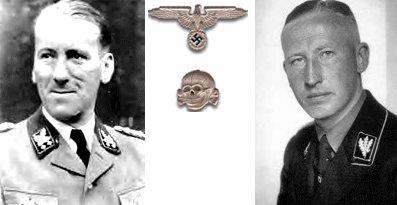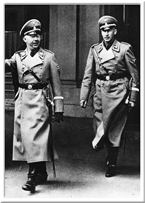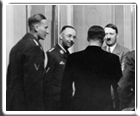Dept I- VII
Department I
(Human Resources) Had to fullfil administrative tasks and was
responsible for agents in and out of the country as well as for
the training of collaborators who should not be threatened by
any illegal act
Department II
(organisation, administration, law) Had to expatriate "Enemies
of the State" and Jews and expropriate the possessions of the
deprived persons. This department was also responsible for the
construction of those vehicles, in which Jews were killed by
exhaust gas
Department III
(domestic news service)Collected and used
reports of the various "Leitstellen" (subordinated offices)
from all parts of the Reich about the effects of administrative
measures on the population. The department also delivered
opinions about the political reliability of particular citizens
which were sed for nominations and promotions in the
administration, economy and science.
Department IV
(Gestapo)Was responsible for the persecution
of real or supposed NS-(Gestapo) opponents.The department had
the power to impose "ProtectiveCustody" against everybody at
any timePoliticians of all political movements, priests of all
confessions, Jews and "unpleasant citizens" were sent to
concentration camps without justification, if they,according to
the RSHA-opinion, had received too little punishment Part of
that department was the "Referat IV B 4",where Adolf Eichmann
planned the "Final Solution of the Jewish Question", the
systematic murder of German and European Jews. The deportations
into the extermination camps were organized here.
Department V
(Criminal Police)Was in charge of the
persecution of non-political crimes.A further task was the
persecution of Gypsies,procedures to kill insane people were
alsodeveloped.
Department
VI
(Foreign news service)was responsible for
espionage and counter-espionage abroad.
Department VII
("Weltanschauliche Forschung")Administered
bookstocks and archive materials of political and (Ideological
research) religious content, which had been confiscated from
Jews, Freemasons and politicians, in churches and libraries and
assessed their value.
R S H A Reichssicherheitshauptamt Reich Main Security Office
 The
RSHA was the central SS-department; all official and secret
police and security organs of the Third Reich were led by the
RSHA. There was a multitude of departments, offices, groups and
sub-divisions and for this reason the department was not
transparent for outsiders. One of the powers of the RSHA was
the impositionl of "Protective Custody", which meant the
deportation into a concentration camp without trial or the
possibility of appelleal for the victims. The SS-leaders within
the RSHA were provided with almost unlimited power.
The
RSHA was the central SS-department; all official and secret
police and security organs of the Third Reich were led by the
RSHA. There was a multitude of departments, offices, groups and
sub-divisions and for this reason the department was not
transparent for outsiders. One of the powers of the RSHA was
the impositionl of "Protective Custody", which meant the
deportation into a concentration camp without trial or the
possibility of appelleal for the victims. The SS-leaders within
the RSHA were provided with almost unlimited power.
Dr.Ernst Kaltenbrunner (left) was appointed Head of the RSHA after Heyrichs Death in 1942. He was an Austrian Nazi and previously Head of the Austrian SS.
At the Nuremberg Trials, Kaltenbrunner was charged with conspiracy to commit crimes against peace, war-crimes and crimes against humanity. The most notable witness in this trial was Rudolf Hoess, the camp commander of the Auschwitz concentration camp.
Kaltenbrunner was found guilty of war crimes and crimes against humanity and sentenced to death. He was executed on 16 October 1946.
The Myth
The Members of the RSHA are sometimes described as as brutal, poorly educated, primitive and socially deprived individuals, unable to hold down normal jobs in civil society, this is simply not true. The Nuremberg Trials revealed that the German elite lawyers, physicians, officers, and entrepreneurs were deeply involved in the mass murder and genocide.
The Truth
Those who would later take up leadership positions in the RSHA, the years spent at university would prove to be among the most decisive in their lives. Only about one quarter of the RSHA leadership came from families with a university background; 60% were from the lower middle class, with fathers who were small businessmen, technicians, engineers, craftsmen and, above all, civil servants in intermediate or higher positions. The Reich Security Main Office was an institution for social climbers. Significantly, more than three quarters of those in the top ranks of the RSHA had passed their Abitur (the school-leaving examinations), and, as mentioned above, two thirds had attended the university while nearly one third also held doctorates. Thus, the leadership corps of the RSHA was by no means a collection of human failures: it was not recruited from the margins of society, but was part of the academically educated bourgeois elite. More than half of those who held a university degree had studied law or political science, but a significant proportion, about 22%, had majored in the humanities in subjects such as German literature, history, theology, journalism and philology. The highest positions within the RSHA were taken up by lawyers, historians, philologists, and journalists. Those who held degrees in fields other than law were, for the most part, to be found in positions in the SD. Numerous members of the RSHA leadership had been activists in the National Socialist Student Association (Nationalsozialistischer Deutscher Studentenbund, NSDStB). All those who, in their later SS biographies, mentioned membership of the NSDStB before 1933, also listed the political offices they had held in the organisation.
These people were indeed above average in their education. It should also be taken into account what the average school leaving age was in the first half of the twentieth centaury was !
The street fighting thugs of the SA or Brown shirts lost their influence after the night of the long knives in July 1934.Most of the leaders of the SA were indeed just uneducated thugs but were eliminated on that night but this "stigma" stayed with the Nazis even up until today. A disturbing truth is that the "thugs" were replaced by educated and ruthless people corrupted by the Idea they could rule the world.
Reichsfuhrer-SS
 Reichsfuhrer-SS Heinrich Himmler (left )
with Reinhard Heydrich in Vienna, March 1938.
Reichsfuhrer-SS Heinrich Himmler (left )
with Reinhard Heydrich in Vienna, March 1938.

Heydrich left, Himmler beside him andHitler on the right. This was at a meeting in Prague castle.

Three members of the RSHA from left to right :
Adlof Eichmann, Dr. Otto Ohlendorf and Heinrich Muller.
After the War Dr. Ohlendorf was sentenced to death and hanged at the Landsberg prison in Bavaria on June 7th, 1951
Eichmann escaped after the war to Argentina, he was spotted and then kidnapped by the Mossad,tried in Israel and executed on May 31, 1962.
Heinrich Muller was the head of the gestapo he remains one of the few senior figures of the Nazi regime who was never captured or confirmed to have died.
